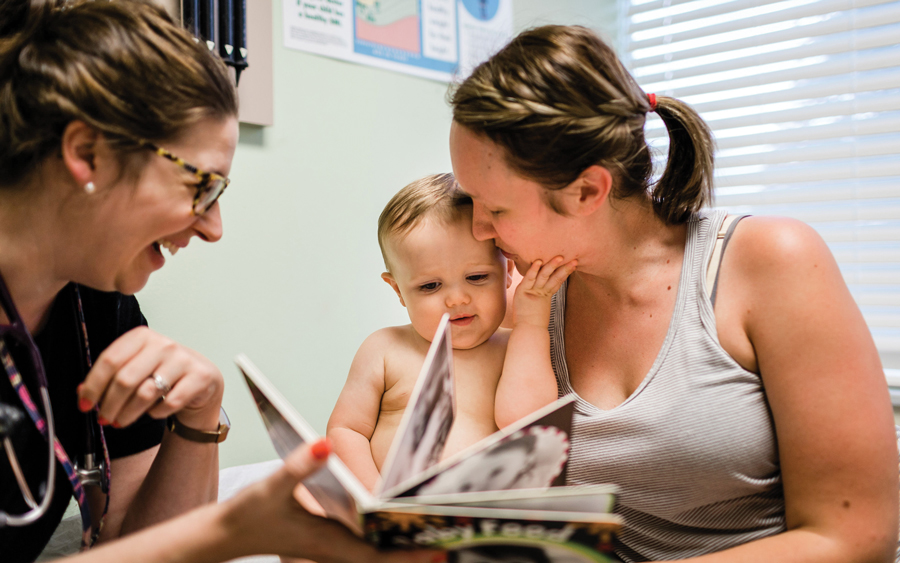How local nonprofits – Read to Them, Lit Limo, Reach Out and Read, CMoR, Little Free Library – are helping connect kids with books in in under-invested regions.
A re-purposed school bus driving around Richmond. An intersection in Church Hill. A doctor’s office off Patterson Avenue. The Children’s Museum of Richmond. A VCU clinic.
If you’re wondering what these things throughout greater RVA have in common, let’s end the suspense. The answer: free books for kids.
While school and county libraries offer kids the opportunity to borrow books, there’s a growing desire and need for young people to have books they can keep, free of charge, to build or add to their own home libraries. After all, the research is clear – exposing children to books during their formative years leads to academic and personal growth as they age.
Here’s how Richmond is making that happen.
READING IN STYLE: THE RPS LIT LIMO
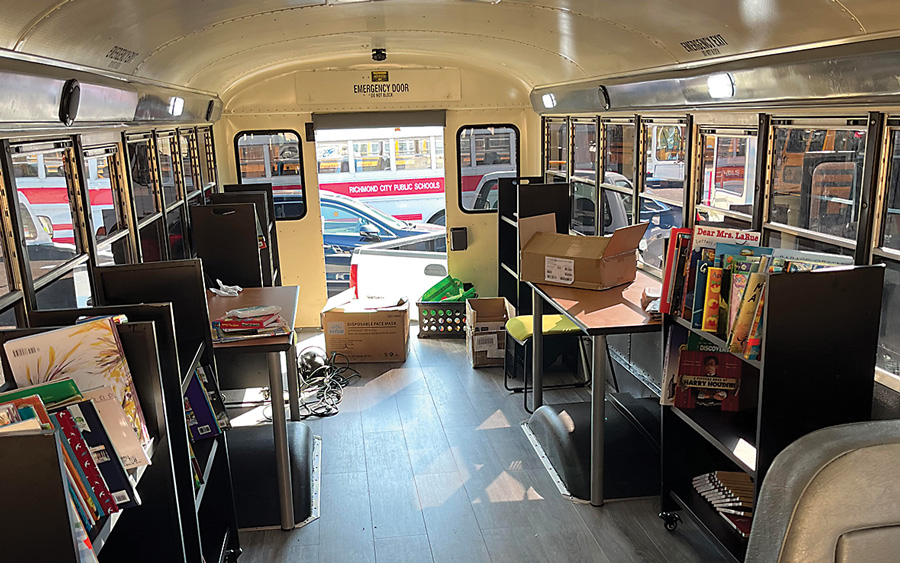
When the pandemic hit, Richmond Public Schools librarian and instructional specialist Judy Deichman was fielding all the safety concerns you’d expect, but getting license plates and outfitting the interior of a school bus were also on her mind.
Deichman is literally the driving force behind RPS’s Lit Limo, a bus that has been transformed into a library on wheels. The goal: to get books into the hands of students outside of normal school library hours.
While students are generally told what and when to read in school, receiving a book of their choosing is priceless.
“We want students to have that love of reading,” Deichman explains. “There’s all kinds of research to support that student choice, when it comes to what books they can read, is so important.”
When the Lit Limo started in early 2020, Deichman says there were eager students waiting at RPS food bus stops, where families picked up meals. Why not distribute books? As schools pivoted to virtual learning, the modified bookmobile kept rolling, making its way to twenty-five elementary schools each week. Now, the bus covers established zones throughout the city and participates in numerous community events in an effort to put books in kids’ hands.
Throughout it all, Deichman has been thrilled with the response.
“Ever since we started, I have been amazed by the support, and we’ve seen a change in our students. I have students who are requesting books now, which is letting me know that they want more books and are getting that love of reading.”
The Lit Limo distributes all sorts of reading material, from board books to YA novels. It also includes a bilingual Spanish section.
Deichman is attuned to student interests, always making sure to have titles that are meaningful and personal. We are “very deliberate about including books that they [the students] want to read, that they can see themselves in, and that they can relate to.”
Funded by RPS, the Lit Limo’s shelves are lined with new books, overflow from school libraries, and books that have been donated by community members.
Whatever the book, once a student selects it, it’s theirs.
“Truly everything on the bus is for them to keep at home,” Deichman says. “We feel that getting those books in the homes will precipitate and push forward the kids getting read to.”
And, if a student sees two irresistible titles? “If they ask for more than one book, the answer is never no,” says Deichman.
If you’d like to donate books to the Lit Limo, contact Deichman at jdeichma@rvaschools.net.
THE LITTLE FREE LIBRARIES THAT COULD
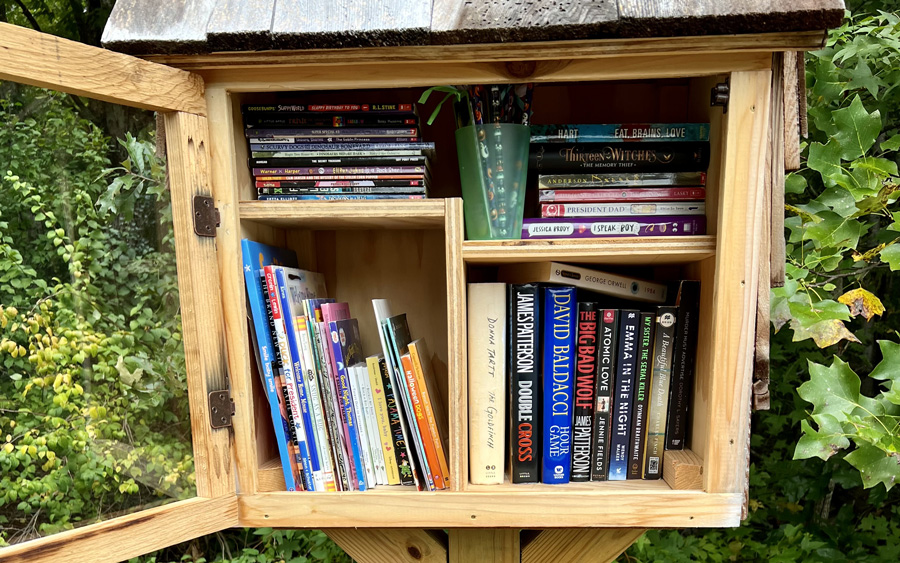
There’s nothing quite as hyper-local or quaint as a Little Free Library – a book-sharing box with a plexiglass window set atop a post.
These pint-sized and often adorable libraries, which have become popular across the globe, operate on the take-and-share premise; if you’d like to take a book, take it, and if you’d like to share one, share it. Little Free Libraries are maintained by stewards (most often a homeowner, business, or community organization). Stewards can purchase pre-built libraries or construct their own. In either case, the cost to register and receive a charter for a Little Free Library is around $40. Because they are operated on the honor system, it’s ideal when everyone pitches in to maintain a steady supply of titles in each box.
The Little Free Library website includes a locator tool, and there’s even a mobile app, so finding a Little Free Library can be accomplished on the go. The app also makes it easier for stewards who are maintaining a library. With close to one hundred in the greater Richmond area, there’s sure to be a book box in your neck of the woods. And the books in Little Free Libraries are for all ages to enjoy, including adults.
“Studies have repeatedly shown that books in the hands of children have a meaningful impact on improving literacy,” a spokesperson for the nonprofit says. “The more books in or near the home, the more likely a child will learn and love to read. These book-sharing boxes play an essential role by providing 24/7 access to books in areas where books are scarce.”
A self-professed avid reader and lover of books, Midlothian resident Natalie Saltzberg is the steward of a Little Free Library near her home, which she stocks with titles – many donated by family and friends – for readers of all ages.
“Being a steward has been so rewarding,” she says. “It warms my heart when I see kids stop by on their scooters and grab a book or adults popping by on their afternoon walk.”
Saltzberg sees her Little Free Library as a resource for children who seek out distant lands as well as those who are searching for themselves in literature, both of which can be impactful.
“Being able to have access to books where you can experience someone else’s life or relate to someone who looks like you is so important for kids. It creates empathy and understanding and encourages kids of all ages to ask questions and be curious,” says Saltzberg.
For Ned Haley, who lives in Church Hill, the decision to charter a Little Free Library was made when he noticed both the number of families with young children in the blocks surrounding his home and the lack of a Little Free Library in the immediate neighborhood. Plus, the city library was too far of a walk for most locals.
With a growing number of Little Free Libraries in the East End, Haley hopes the books will help those children who may be struggling with reading as well as contribute to the sense of community in the area.
“Books can not only acquaint [kids] with experiences outside their own life, but also help them develop their imagination,” says Haley. “For children growing up in financially limited circumstances and/or with few if any adult mentors, books can help them think beyond their own experiences, and potentially develop skills and knowledge that will enable them to move beyond those circumstances as an adult.”
Richmond’s Kiwanis Club was drawn to a literacy partnership with Little Free Libraries to get books into the hands of children with limited access. Robin McCallister, co-chair of the club’s Little Free Library committee and steward of its library located at the Center for Families in Transition on Leigh Street, says the contents of the club’s libraries (on Leigh Street as well as several locations in the Jackson Ward/Carver communities) reflect a wide range of authors and experiences.
“As we curate the books to be stocked in our Little Free Library, we make sure that we select diverse books written by diverse authors,” she explains. “It is important that the children who use our Little Free Library see themselves in the stories.”
A TRIP TO CMoR, A BOOK TO TAKE HOME
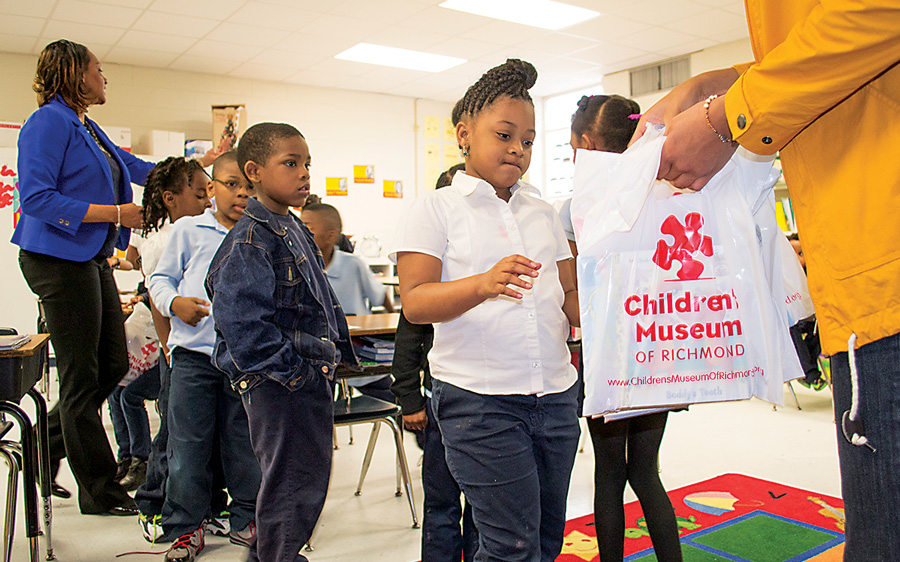
“We’re the best-kept secret!” says Krista Dawson, director of education at the Children’s Museum of Richmond, about its book bank.
In operation since 2012, the book bank used to be managed by Read Aloud Virginia and was housed at the Richmond Public Library. Now at CMoR Downtown, the bank procures books for infants through school-age children via book donations from individuals, groups hosting book drives, and monetary donations and sends them back out into the community for children to take home.
“We know the research and the value of having it [the book bank],” Dawson says.
The CMoR bank can deliver books to nearby schools or have them ready for students when they’re at the museum on a field trip. There’s also a bookmobile, affectionately called the Book Buggy or Museum-Mobile, that helps circulate reading material in the community.
“Kids are learning to read, and they’re reading to learn,” says Dawson. “One of the things that can be most impactful is having background knowledge bigger than your personal experience, and a lot of that can come from books.”
Donations of new or like-new books, especially bilingual books and those featuring diverse characters, can be dropped off at CMoR’s downtown location on Broad Street by appointment only. You can find details at childrensmuseumofrichmond.org.
A PRESCRIPTION FOR LITERACY THROUGH REACH OUT AND READ
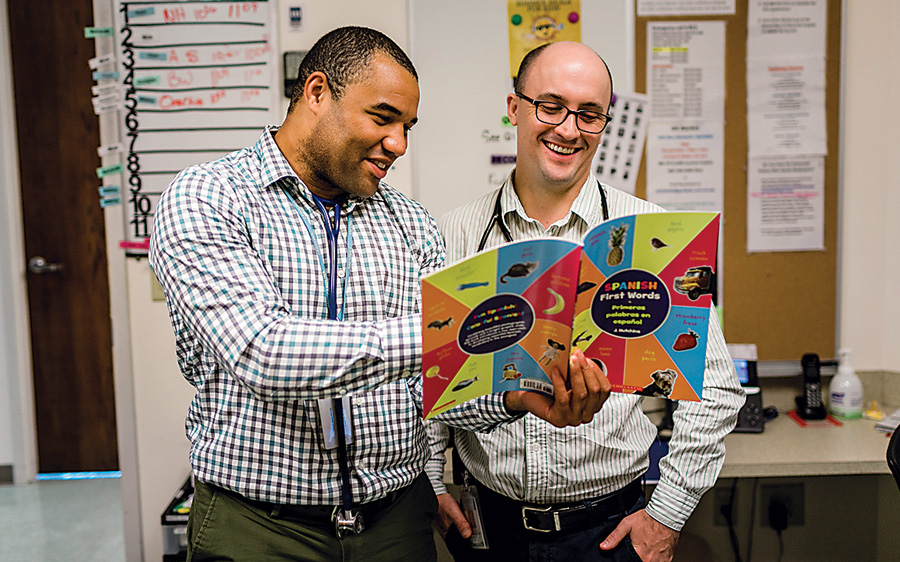
It might be the last place you’d expect to receive a board book, but given the profound implications for kids’ academic, social, and emotional growth, it makes sense that reading would be part of a well-child doctor’s visit. This is the mission of Reach Out and Read (ROR) Virginia.
ROR Virginia has more than 700 medical providers at 106 sites throughout the Commonwealth in their network, and each of their patients receives a book during well-child visits from infancy through age five.
The provider “prescribes reading by modeling read-aloud strategies while teaching and training the parent how to share books and why it is important,” explains ROR Virginia Director of Communications Suzanne Metcalf.
Bergen Nelson, MD, serves as ROR’s regional director of the Carolinas and Virginia. A pediatrician and child health services researcher at Children’s Hospital of Richmond at VCU, Dr. Nelson says introducing books and providing early literacy tips for families is crucial.
“A children’s book is a powerful tool for both parents and medical providers. Prescribing ‘reading together’ is one of the most important prescriptions I write,” says Dr. Nelson. “Everyday moments created together around a book have the potential to build resilience in both children and adults, buffer stress, and support safe, stable, and nurturing relationships that allow children to thrive.”
EASING COMPLEX MEDICAL CARE CHALLENGES WITH BOOKS AND READ TO THEM
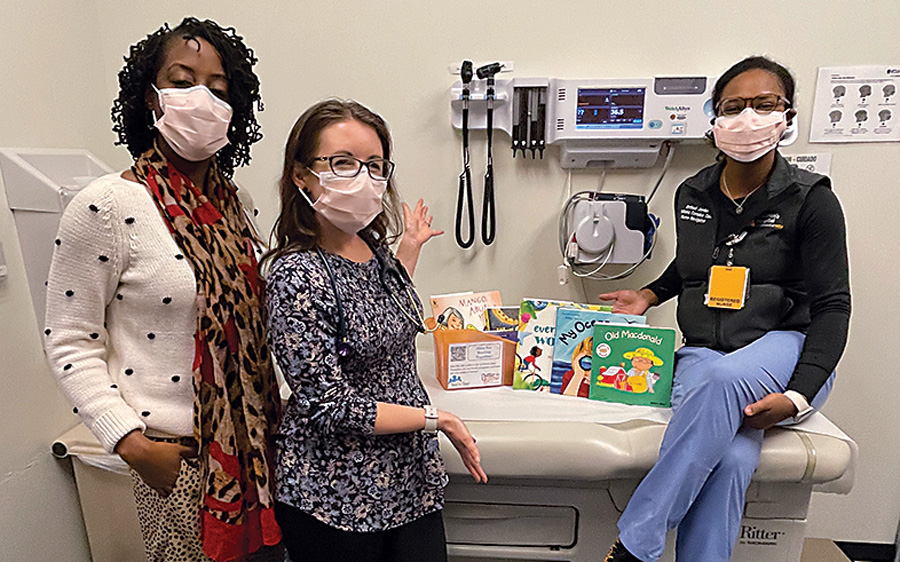
Children with complex medical illnesses and their families face many challenges, but thanks to a new partnership between Read to Them and Better2gether RVA, children at a VCU clinic are finding a measure of comfort in reading.
Read to Them, a Richmond-based national nonprofit that focuses on promoting literacy within families, schools, and communities, joined forces with Better2gether RVA, an organization that provides support and resources to families of children with complex medical illnesses or those requiring specialized treatment, to give new books to pediatric patients as they receive care at VCU’s Complex Care Clinic.
The clinic, which opened in 2021, serves nearly 200 patients ranging from infants to age twenty-one.
Tiffany Kimbrough, MD, who serves as the medical director of the complex care clinic and mother-infant unit at Children’s Hospital of Richmond at VCU,
says books provide uplifting moments during what are typically lengthy days for patients and their families.
“We are just so excited to have something to offer families for long doctor’s visits. This is something our kids can use while they are here and they are waiting, but also take home with them and continue to promote early literacy, reading, and good attachment with family,” says Dr. Kimbrough.
Through this partnership, patients and their families can receive everything from board books to graphic novels. There are books in English and Spanish. Bingo cards, enrichment activities, and literacy tips round out the reading materials families can receive to help build their home libraries.
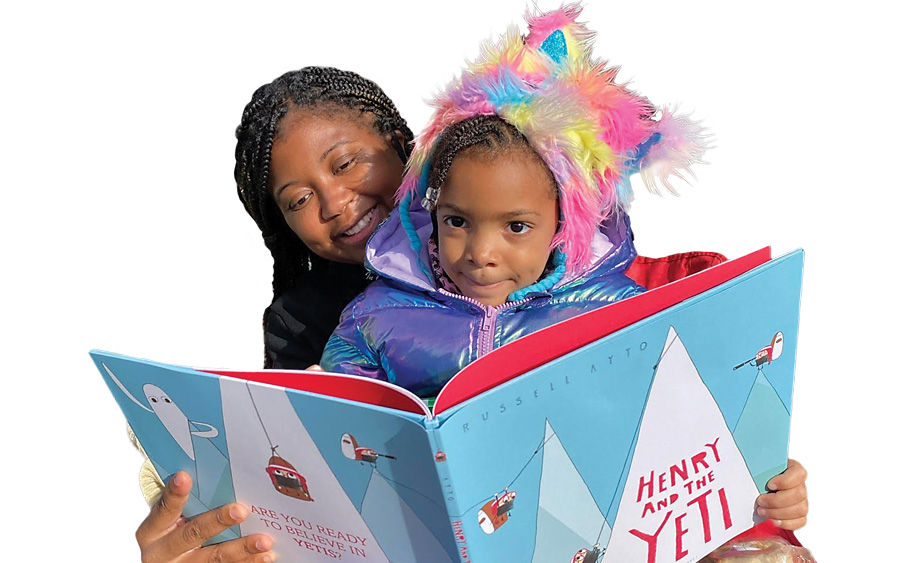
And there you have it – a sample of the many ways neighbors and organizations are stepping up to boost literacy and build home libraries throughout Richmond. As an unabashed bibliophile myself, I look back fondly on those early days of building my own home library: a book gifted by my family here, a used book purchased there, and perhaps even a free book from a group working to inspire a love of reading in kids. No matter its origin, each title worked its magic. This – to be connected to and inspired by books – is my hope for young people throughout Richmond. Thanks to programs like these that connect kids and books, the chances of this being realized are much better.


